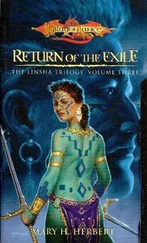Andrew Britton - The Exile
Здесь есть возможность читать онлайн «Andrew Britton - The Exile» весь текст электронной книги совершенно бесплатно (целиком полную версию без сокращений). В некоторых случаях можно слушать аудио, скачать через торрент в формате fb2 и присутствует краткое содержание. Жанр: Триллер, на английском языке. Описание произведения, (предисловие) а так же отзывы посетителей доступны на портале библиотеки ЛибКат.
- Название:The Exile
- Автор:
- Жанр:
- Год:неизвестен
- ISBN:нет данных
- Рейтинг книги:5 / 5. Голосов: 1
-
Избранное:Добавить в избранное
- Отзывы:
-
Ваша оценка:
- 100
- 1
- 2
- 3
- 4
- 5
The Exile: краткое содержание, описание и аннотация
Предлагаем к чтению аннотацию, описание, краткое содержание или предисловие (зависит от того, что написал сам автор книги «The Exile»). Если вы не нашли необходимую информацию о книге — напишите в комментариях, мы постараемся отыскать её.
The Exile — читать онлайн бесплатно полную книгу (весь текст) целиком
Ниже представлен текст книги, разбитый по страницам. Система сохранения места последней прочитанной страницы, позволяет с удобством читать онлайн бесплатно книгу «The Exile», без необходимости каждый раз заново искать на чём Вы остановились. Поставьте закладку, и сможете в любой момент перейти на страницу, на которой закончили чтение.
Интервал:
Закладка:
At least, that was the general assumption. Personally, Lily wasn’t so sure. Less than a month earlier, the United States had levied harsh sanctions against the North African country, adding to the heavy restrictions already in place as a result of the ICC’s indictment. The punitive measures had touched the highest levels of the Sudanese government, most noticeably in the case of the defense minister, whose U.S. accounts had been frozen.
Al-Bashir had responded to the ICC arrest warrant through polite, if evasive, diplomatic channels-a public fight with its 109 member nations was the furthest thing from what he wanted or needed. But the United States, a nonmember still trying to dig its way out from the global ill will generated by its Iraqi conflict, was another story…and a convenient target for his chest-thumping wrath.
Months after the new sanctions were imposed, he’d given a fiery speech condemning them. And while he’d stopped short of threatening outright retribution, there was no doubt in anyone’s mind that he was on the verge of striking back at the world’s lone superpower and sending out an indirect, albeit powerful, message to the ICC-namely, his intention of submitting to foreign justice was nil. He was not going down without a fight and had cast himself in the convenient, familiar role of a victim forced to retaliate against the imperial American bully.
The question, in the big picture, was how, and when, the first blow would come.
Lily Durant’s recent experiences at Camp Hadith, however, had given her a more close-up perspective. For Lily the focus narrowed down to a little refugee camp in the middle of an African nowhere, a teenage girl caught in the throes of her fever dreams, and her fear that the inexorable madness of attack and reprisal would come, rolling them into the ground.
The cold air of the desert night seeped in through the open door and clawed at the exposed flesh of the commander’s face and throat. He stood inside the darkened compound and watched as his men gathered on the hard-packed dirt of the parade ground in front of his office. The building was pitch-black, but the lights of the compound were ablaze, rendering him invisible to those milling about in the open area. They were laughing, joking, and slapping each other’s shoulders. They were full of life, and watching them, the commander could not help but smile himself. He could feel their excitement, and it reminded him of the first time he had embarked on a similar venture-the first time he had successfully probed the fragile constraints of his own moral character.
He could not fully relate to these men, as they were not real soldiers in his mind, but a disparate collection of animals bound loosely by the promise of separate rewards.
Now he watched as they checked and rechecked their weapons, an assortment of small arms procured from every possible source: Kalashnikovs from Ukraine, PP-19 submachine guns taken out of Afghanistan, and Belgian-made FAL rifles left over from the bloody civil wars in Liberia and Mozambique. A few carried AR-15s, the civilian version of the U.S. Army’s M16. Their favored tools, however, were not the battered firearms they carried, but the knives, hatchets, and machetes that hung from their belt loops.
Just as they carried a variety of arms, the men wore a wide range of clothing. A few had desert fatigues of the sort used by the U.S. military, a uniform that carried a certain level of prestige in the mixed unit. The rest wore police uniforms, tracksuits, or T-shirts and jeans. Like the inhabitants of the camp they were planning to strike, they were bound only by exigencies. His mercenaries, with their uneven training and wild temperament, accepting a slight degree of discipline in exchange for the promise of combat and treasure. The dedicated and more practiced mujahideen sharing their desire for earthly plunder, but seeking to pad their material bounty with the eternal gratifications of Heaven.
A patchwork force, yes. Still, the commander knew how to keep them primed and motivated as they prepared for action, knew what heady elixir was drunk by his ragtag coalition of zealots, godless infidels, and outlaws, whose dutiful prayers were only to assure they reaped the rewards of the destruction they were about to deal out. He’d savored its taste many times-and welcomed it.
They were bound now by anticipation. Anticipation for the work they would soon carry out with brutal, unrelenting purpose. Anticipation for the job he had given them, for the blood they were about to spill…and for the rewards that were sure to follow.
Their raucous laughter poured into the night and over the dark buildings like a rippling black tide.
The commander did his best to maintain a stoic bearing as he watched them, although he shared their contagious enthusiasm. The facade was necessary to preserve the fragile balance of power that existed in the small garrison. He held control over life and death in his hands, and there were few limits to what he could do. In the space of a five-minute telephone call, he could seal the fate of 100 Masalit villagers. With nothing more than a polite suggestion, a whispered word to the major in charge in Nyala, he could condemn a dozen Dinka children to death by fire. It was the ultimate authority, and he had never used it sparingly. In that respect, at least, this night’s work would be no different from all the rest.
A sudden noise pierced the commander’s thoughts, and he stepped through the open door into the cold night air, where the sound of approaching diesel engines was more pronounced. He shivered as he waited impatiently, his broad face twisting into a frown. As bad as it was during the day, the desert was even less accommodating at night.
Fortunately, he did not have to wait long. Less than a minute after he stepped out of the building, the trucks rolled into view and stopped next to the parade ground, a cloud of dust rising into the air, mixing with the stench of diesel fumes, cigarette smoke, and un-washed bodies. There was a loud babble of voices, and the keyed-up men began moving toward the vehicles.
The commander’s car, a borrowed white Mercedes-Benz, was already waiting in front of his office. The driver was behind the wheel, his engine idling. The commander walked over, opened the door, and slid into the rear seat. He shut the door and shivered with pleasure when he felt the warm air churning out of the vents. He gave a signal to his driver, and the car rolled forward, the trucks following in convoy.
As the small line of vehicles left the main gate forty seconds later, the commander pulled a satellite phone from the deep right pocket of his field jacket, dialed a number from memory, and lifted the phone to his ear. Two rings later a man answered.
“We’re on the move. Turn off the phones, and send the plane.”
At first, Lily didn’t understand why she was awake. She lay still for a long moment, wondering what could have possibly roused her from her much-needed sleep. She was conscious of the frigid air on her face, the warmth of her sleeping bag, and the mosquito netting that was draped less than a foot over her head. The camp was surprisingly quiet, except for the distant sound of an infant’s cries. Everything was just as it should be, yet something had pulled her from the deepest sleep she’d had in a month…and that itself was unusual.
She lay there for several minutes, listening in her stillness. But while she heard nothing out of the ordinary, she could not shake the sense of lingering dread.
She tugged her arms out of her sleeping bag, flopped onto her left side, and pressed a button on her wristwatch-a sturdy Alpina her uncle had given her as a going-away present. The LED display told her it was just after 4:00 a.m., which meant she had been out for three hours. After making her rounds in the hospital, she’d walked straight back to her tent, which was located less than 100 feet from the building’s main entrance. She could have had a bed inside the hospital, like the camp’s doctor and the two other nurses, but had chosen instead to sleep in a tent, not wanting to take away from the refugees the already scant space inside the building.
Читать дальшеИнтервал:
Закладка:
Похожие книги на «The Exile»
Представляем Вашему вниманию похожие книги на «The Exile» списком для выбора. Мы отобрали схожую по названию и смыслу литературу в надежде предоставить читателям больше вариантов отыскать новые, интересные, ещё непрочитанные произведения.
Обсуждение, отзывы о книге «The Exile» и просто собственные мнения читателей. Оставьте ваши комментарии, напишите, что Вы думаете о произведении, его смысле или главных героях. Укажите что конкретно понравилось, а что нет, и почему Вы так считаете.










